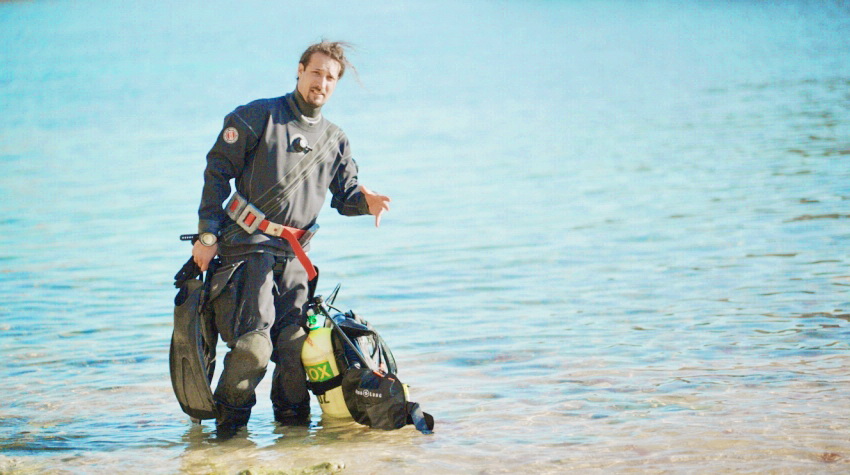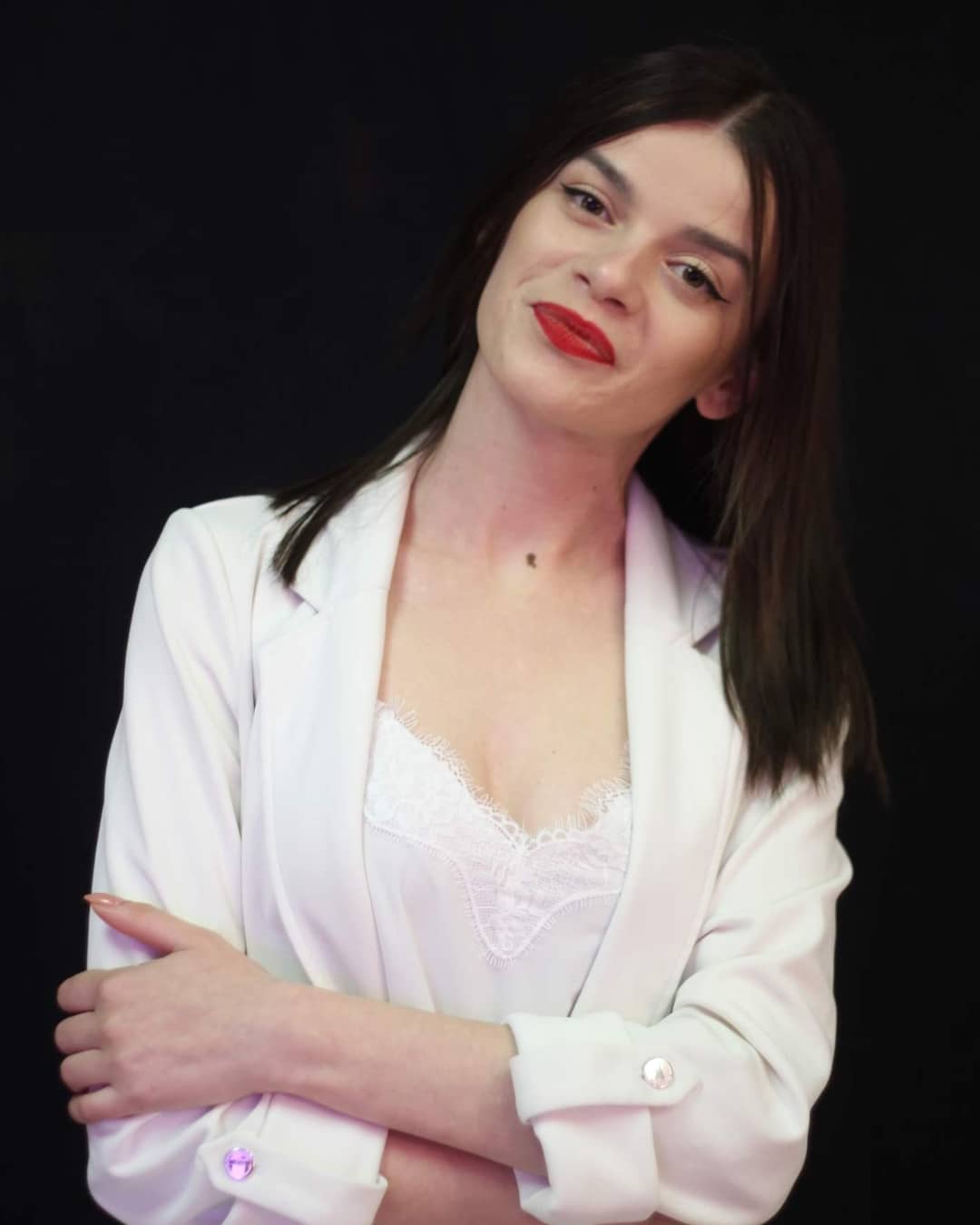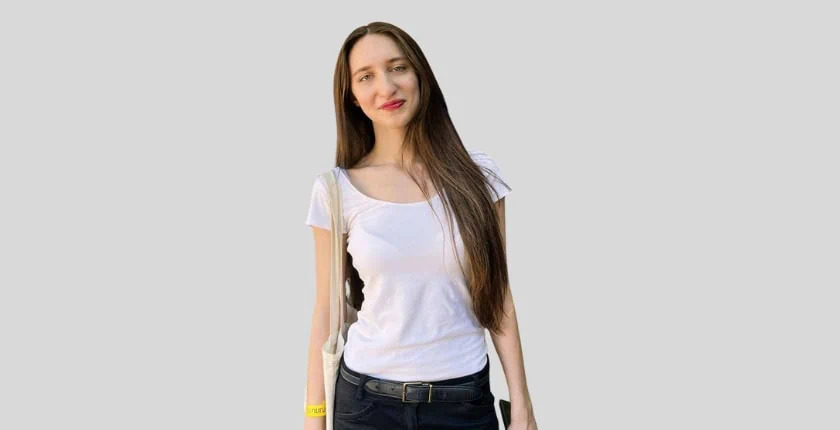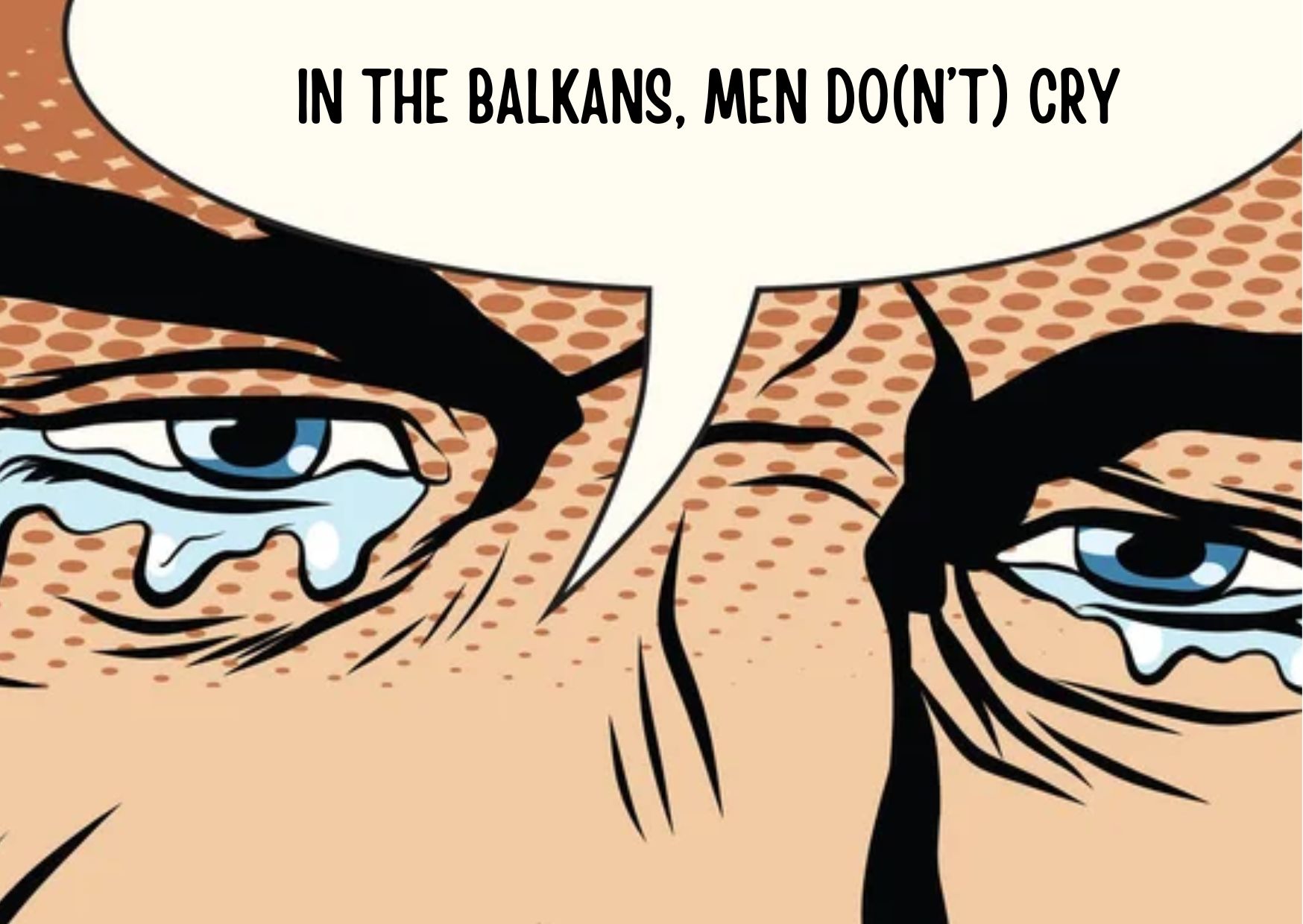
Andrej Gajić is a young scientist, author, deep diver, ROV pilot, award-winning underwater photographer and parachutist. He attended elementary school and high school in Bosanska Gradiška and Bugojno, and completed his biology studies at the Faculty of Science in Sarajevo. He is currently Head of the Department of Marine Animal Studies at Shark Tales at National Geographic, General Manager of Sharklab. As part of field research, it studies marine habitats in the Mediterranean, Adriatic and Red Seas, while laboratory research is related to the detection, treatment and prevention of diseases in sharks. He extensively explored the seabed of the Neum Bay and the eastern Adriatic. He is the author of more than 70 scientific papers , two books and several short documentaries.
Andrej, first of all, thank you for agreeing to do this with us. We are going to look back at the beginning of the high school period of your life. You attended high school in Bosanska Gradiška in Bugojno, right? Now that you look back on that period, do you remember what expectations you had of your life? What were you striving for then?
Well, I remember. I think I aspired identically to what I have achieved today, thank God. I did not have these exact goals, like achieving a position at this institution, this title, having this number of scientific works published, but in essence what I expected and what regarded my professional development is absolutely what I still work on today and what I largely already achieved. And I think that high school is the most ideal time for someone to seriously think about what they want to do, because often people do it in postgraduate studies, when they should already have a defined personality and a good part of their career.
Can you remember what problems you were going through in high school?
I don’t have to think hard, I remember every day when I get up. I went through… you know, career development in any direction, including mine, brings with it a number of difficulties and that’s why people fail at something, not because they are not intelligent, not because they don’t learn, but because people mix the dice. Character is what’s determinant of success, it is not intelligence, nor anything else. If you don’t have a character that predetermines you to succeed in something, then the latter will unfortunately not help you that much or you will achieve but you will go into a totally different period that is not good. For me, as I progressed in my career, those problems from high school, then the ones from college, then later from graduate school, and then the ones from work, are in essence … they grow, they don’t stop. But what is important is that you learn to deal with them through life. My biggest problems from high school are funny to me today, so are those from five years ago. What is important to emphasize now is that I divide it into two large groups in my life; before affirmation and after affirmation. You know, when you are established in the field in which you work, then all the problems are much bigger, not smaller, but it is much easier to deal with them. Unfortunately, in the society we live in, when you stand out with your work, it tries to trample you, everyone, it is not only in my case, but all the ones I know; in sports, science, music, art, they pretty much go through the same thing. And those periods of, say, high school, part of college, are those periods when a man needs to prove himself, and when everyone is trying to make fun of you, trying to restrain you in some way, subvert you. But I think that this is something that a person also needs to go through and that this is exactly what builds that character, which is necessary for someone to, in the future, deal with the challenges ahead. In the right way.
Why did you decide to study biology at the Faculty of Natural Sciences and Mathematics?
You know, when I enrolled in college, I already had, uh, an engagement within the EU and I had a few colleges; England, France and Split, as far as I remember, that I was considering, but then due to a combination of some life circumstances I enrolled in Sarajevo, where I never thought in my life I would study. And when I look back at it now, from this perspective, I would make the same decision. If I were offered Harvard, Oxford or Sarajevo, I would choose Sarajevo again, not because that faculty is good, on the contrary, it is catastrophically bad, unfortunately, as is the entire education, the entire system of this country, but I had the opportunity to work with a colleague Suad who was my mentor later on the theses and who is essentially responsible for my upbringing in science and for the success I have today.
Did you, at any point during your studies or at the beginning of your career think about giving up?
Yes. I mean, like everyone else. Thinking of giving up … it’s something you have to deal with all the time. It’s interesting, let’s just say I’m not going to follow my example, I’ll tell you in a more interesting way. My colleague, we had a meeting at National Geographic in Washington, she came, she cried and she told us she wants to give up. Then a colleague and I asked her why, she said “I don’t know what I have achieved in life“. So, if a 29-year-old girl who became the head of studies at, objectively, the strongest institution in the world for what we do, thinks she has done nothing and she is afraid of giving up, then you can imagine what it is like for someone who is still in the period of affirmation, who has not yet, say, accomplished anything capital yet. These are things that everyone deals with, and in my opinion, what is important is that a person gets up after they fall. That is success, nothing else. People often make mistakes, especially in our society, this post-Yugoslavian one, considering success as a job in a state institution, I don’t know, a contract for an indefinite period and similar things … Most of us think that success is just getting up every time you fall, whether you want to give up on something in college, or to achieve one of the striking and capital positions tomorrow, but again you want to give it up like our colleague, and when you don’t do that you are essentially successful, right?
And what is it that kept you from giving up? Why didn’t you give up?
I am not a person that gives up. On the other hand, I had faith that it would be good if I did my best and that the results had to come. Now when I advise my colleagues and students I often say that if you have the right way to invest energy, the results will not be missed, it is going to come, but that moment of patience is important, I was building a career for at least 8-9 years in very difficult conditions. I believe that a career that is built either quickly or in an inadequate way, will not be appreciated enough as the one that you build with your own struggle, not from scratch, but far below.
At the very beginnings of your career, how important was the support of the environment and your loved ones to you?
Well, honestly, family support always plays a key role in everything and the importance of it cannot be emphasized enough. On the other hand, the support of the environment did not play much for me, it does not play much today, although I am grateful, because I have exceptional public support. I’m really grateful, these are people I love dearly and to whom I owe and who I am honored to represent when I show up somewhere, but on the other hand the first five years of my career have been diametrically different. I worked in those conditions, I work in these as well, which means that it is not of crucial importance to me. I know that the work we do, we do among the best people in the world, and I know what the quality of our work is and I know what the benefits of our work are. The rest is not very important to me.
We will now talk a little about the youth in our society. Do you think that young people in Bosnia and Herzegovina are passive today?
Yesterday, today, tomorrow, young people in Bosnia and Herzegovina are passive. That is the reason for a very bad situation in society, bad opportunities. Because young people don’t care. You know, you go to college, you finish it easily, it’s super cool for you. You get some grades, I don’t know, you’re no competitors in the job market, objectively. Not just in the world, the region, but nowhere. And then a light comes on, you have a problem. This problem should have been solved long before you started, especially formal education, which in our society, unfortunately, is very low.
How would you evaluate the education system in Bosnia and Herzegovina?
Like I said, very bad. It is not my grade, it is the grade of google scholar, it is the grade of webometrics, it is the grade of anyone who types the titles of scientific papers of the majority, at least the faculties oriented to me, and compares them. So you need to distance yourself there, it’s not my rating, it’s a rating when you look at competitiveness with anything. For example, it is absurd that one person under the age of 35, who has never been employed at the University, has a higher H index and citations than two departments in total. It speaks to quality, it doesn’t speak to my opinion.
Can young people do anything to change that, to improve it?
Of course. The faculty exists because of the youth. Unfortunately, in most places, the faculty is a scientific and educational institution. In our country, it is mostly an educational institution, unfortunately there is no science. So, the faculty exists because of young people, if those young people wanted something of quality at the beginning, something would have to change. You know, a group of students won’t listen for a year because it’s not quality teaching or if you’re learning a syllabus that science rejected years ago, then it would have to change. But if it suits you all, logically there is no need for it to change.
If I’m not mistaken, when you were little you were afraid of water, and now you have built a career on it. How did you overcome that fear?
I think you can overcome any fear by confrontation. When you face something you are afraid of, you can easily overcome it. Not in a way that someone throws you into the water, but you face it rationally, and then I think that everything can be overcome. I think everything is the strength of will and effort. Like everything in life. Just as most people have a fear of failure, the same principle.
Do you have any fears today?
Hard to say. I do have, I am very worried about the health, well-being of my family, and people close to me. That hits me hard. On the other hand, I am not worried about myself. And during the work under water, for the last 15 years, there were situations where I literally reconciled that it was the end, but we came out thank God, based on our psycho-physical readiness, knowledge and good training at diving academies. So some fears, in our business, I don’t think you can afford a place to fear. You know, fear, some thoughts, dubiousness is a luxury for us. I often don’t have time to think about my life, because of the obligations I have. I think if they put us in lockdown for 10 years we would have something to do full time every day. And then when you’re in that, say machine, you don’t have time to think about some actions that can be bad, but you have to live with them, nor about the fears, so if you have them, you have to solve them. You don’t have the luxury of saying I can’t do that, no, you have to.
And how do you deal with your really huge success?
Thank you very much. I wouldn’t say it’s a huge success. I look at it differently, although I am very grateful for what I have achieved. I deal with it by letting go. All the things that I can’t objectively control, that I can’t influence despite my hard work, I let them go. I don’t stick to them. And I reckon that in some situations, they will be resolved in some way. And it usually is. If I clung to all the things I can’t control, which significantly affect work, finances, and staff, I would end up disappointed. And most of us work like that, because for you pressure, speed … imagine in normal work in 20 days I visit 20 countries on 3 continents … I don’t have time to think what if something is not good … It will be and we will continue to work. We are doing the best we can at the moment and we know we did our best. That’s the part that matters to me. And what is even more important to me than that business part is that through our work we did not do anyone any harm, we always tried to help someone. I am strictly convinced that it will return and in that way I compensate for the pressure that comes with responsibility, criminal, material expertise and other things that my function brings.
Have you ever been recognized by people on the street?
In fact, it happens a dozen times a week.
What does it look like?
This is one of the greatest achievements that I think you can have, to empower the local community in that way. I’m very glad, not because someone recognized me and wanted a picture with me on the street, but because they connect me to something that tells them that they can do something similar or better, why not, I’m not special in any way. So I am very glad, especially when I have the opportunity to talk to people. When someone stops me, I usually take the time or even drink coffee, I meet them. Because I think that if I can open the door to someone, say, with any of my time intervals, maybe give him some hope when he needs it the most, because we don’t know what the current mental state is, then why wouldn’t I give it? I know what it was like for me when someone gave it to me. When you reach that level that you want, dream, fantasize in life, then you don’t have the same view of yourself as others do. Let’s say I don’t see how my statement would be special or why someone would follow me, but I see how the general public reacts and then I direct most of my activities towards that, trying to make people, especially in the media, get something positive in these very hard times where the priority is the black chronicle and things like that.
How hard is it for you to fit together your business and private life?
Today, no way. It has been extremely difficult for years. You know, when you, uh, want to, say, push through the international, I often call it the real sector, you know we don’t have…formalities don’t play any role in our society, unlike, say, in state institutions, in our faculties, with us you either know how to work, or you are the best or you are not. There is not much philosophy. You have to be constantly in the first place; by publications, projects, papers and ideas, because you are essentially selling your idea. I know, say, I have been working on projects for many years, because it is extremely challenging, you have international competition, where 50 thousand people from Harvard, Yale, Oxford apply and out of those 50 thousand, they give three, four, five. These are things that … I love challenges terribly. And I enjoy them, and basically you are selling your idea, competing with who has the best idea, who best understands the field you are dealing with, it is extremely challenging for me and one of the most interesting things in my professional career. By these, how can I tell you, by these very challenges, man learns to master all other segments of his work.
Do you think that in Bosnia and Herzegovina some professions are valued, some are valued less, and some more, and how do you see that?
Absolutely. See how much mobbing there is, here. For example, you go to the United States, where for the smallest detail, I don’t know, like you patted a colleague on the shoulder, you can get fired because it’s a sexual assault. And look at what is being done and how people are working here. Go to the private health care, how they treat the nurses, it doesn’t matter, towards the cleaner, who is objectively just as important as that doctor and like anyone else. Because if their room wasn’t clean, they wouldn’t be able to work, they wouldn’t be able to clean. So, in my opinion, the worst thing a person can do is to belittle someone else ‘s success. We all have functions in society. I deal with shark diseases, protection and it is logical that this is a group that is attractive and interesting to everyone, so I am also interested. If I were to deal with frogs, like one of my colleagues, who also does an extremely good job, probably no one would care. Why would anyone care about the frogs that live on Stojčevac? And that doesn’t mean, it could be far more important than what I’m doing, which has a much bigger media impact. For example, it doesn’t have to be science, whatever job, I think all professions, all professions, from the man who cleans our street here, to mine or any other, are equally important because we play our part in society. That is why often, for example, in these sessions of ours, when it comes to forming new leaders, it is considered a very irrational move, we cannot all be leaders, who will we lead then, if we are all some kind of leaders. Like, we’re going to make a hundred thousand leaders in Bosnia and Herzegovina, how? There are no people for so many leaders. It’s a little absurd to me, when you think a little better philosophically about that concept. But that valuation of positions, in my opinion, should be equated. The fact that someone has not achieved a super interesting or quality career, say in science or any other field, doesn’t mean in any segment that he is less valuable, on any basis. He does his job honestly, fairly and that is quite enough for him to be equally valued, in my opinion.
Have you ever witnessed young people, when they choose occupations, are advised to choose some more attractive, some more promising occupations for such reasons?
Yes. I witness this every day.
How to deal with it?
I do not know. Because I know what it was like for me to get to my current position, I know how much my position is valued in the world. I know how few people there are, you can count on the fingers of two hands, who are with me in the rank in my business, thank God. On the other hand, I know how unstable my job is. Extremely unstable. And I know how much work it takes to get there. It is clear to me that, if I were to tell ten thousand people my advice, probably one might follow it. Logically, because it is too complicated, too demanding, too uncertain, risky. Then it’s hard to tell someone, follow your dreams and you’ll be fine. These are big words to promise someone, when it will probably not be as good as he imagined, because someone will probably give up in some segment, which we are witnessing in society, which is again not my opinion. What I am trying to advise people in this situation, to say the least, is: try it, because if you try it, you will not regret it later. Even if they failed to do their own thing. Maybe for you, this one, let me say, maybe you will understand through life that for you, a completely different profession is closer and more interesting to you, and that is not a bad thing at all. But if you try, you will be satisfied in life. Because when you do what you love then you have no working hours and no work at all.
Certainly. That’s good advice for sure. What would you advise young people in Bosnia and Herzegovina in general? Should they stay here or get out of here?
Well beware, this is a very difficult question. Unfortunately, I do not see any current perspective in Bosnia and Herzegovina and I share this opinion with the mass of colleagues who have made some foreign successes. I don’t see it because we have a multisystem dysfunction, not only in the education and health system, but when you look at any other. I don’t see the perspective that young people have here, except, well, in some political party or similar way, unfortunately. I was even invited to be the main speaker at a gathering for high school students where the topic was how to succeed in Bosnia and Herzegovina, but I refused. Then the organizer asked me – why, we were counting on you? Because I don’t want to lie to people. I do not believe that it is possible to succeed here in Bosnia and Herzegovina. I haven’t seen anyone, I don’t know personally anyone who did it. I know that you can succeed in Bosnia and Herzegovina. Even all the people they called, besides me, were people who had achieved some success abroad. If I hadn’t gotten a position, say, in National Geographic, Discovery, some of those extremely enticing and sound positions, I would still be doing my job well. I would still do it very essentially, only it would be funny to people. So, Bosnia and Herzegovina did not allow me to achieve that, it did not allow me to do anything, honestly, but I think that Bosnia and Herzegovina, firstly, is a geographical area that I love terribly, secondly it is an area that is extremely rich for, especially, biological studies. There is so much work there, that I responsibly claim that hundreds of people could be employed to work, if there was knowledge, knowledge in the staff for which they are educated and if there was a proper system that would really focus on cultural, historical and natural heritage. If the situation in the state were to improve, this would be an ideal state for work . Ideal!
We heard Mila and Dženan describe you in a few words. Can you describe today’s Andrej in a few words and describe Andrej the student in a few words?
I can. Andrej the student was very dedicated, extremely ambitious and very stupid. The current Andrej is extremely self-sacrificing, extremely ambitious and less stupid. In a sense, I was making some moves, very immature, and when I would go back in time, I would simply do some interpersonal relationships of some things, which I deliberately closed, the exact opposite. Because I got some very high positions very early on, I ran those other studies, and I did it the way I know best. I don’t regret it, but I think that dose of maturity, which I missed and which I may still miss in some fields, was essentially a thing that has progressed through these years. These descriptions, told to me by my dear friends and sister, are, in essence, things that define me even today. I feel that I have not changed since that period, except, let me say, maturity, which is crucial for dealing with work, teams and managing some studies.
What was the most important crossroad in your life, let’s call it a crossroad, something where you had to make some important decisions?
I make very important decisions every day. It’s very complicated to say what it is, I just stopped … before I somehow had time to feel that it was an important decision, now I have to make a decision immediately. But otherwise, I’m not a person who, say, thinks about things. And it’s always, uh, that’s one of the most fascinating concepts in human behavior to me. For example, when you ask someone if they are going to do something, and they answer eh so wait for me to think and then you wait two days for an answer. Are you going home and thinking? I mean, I can’t figure out what that concept looks like. I am, by contrast, whenever something needs to be either done or decided, I always know what I want and I go in that direction. I am always ready to say my decision first and I am ready to stand behind it. I am even ready to stand behind my decisions today, which I made seven years ago. Identical to how I stand behind that decision I made yesterday. The sum of my decisions, very, very bad and the better ones, just brought me to where I am today and is credited with my professional development and the development of me as a person. I think that when I tell you everything, as people say “like tallow”, that is, when everything goes smoothly, when everyone pats you on the back, it is wonderful and beautiful, but it does not contribute to your development. Then you stand still and enjoy being grateful for what you have accomplished. What develops you as a person are your bad decisions, bad moves, bad situations in life, which teach you to be the person you become. The fact that everyone pats you on the back, that everyone wants a photo with you, to praise you, that is wonderful, but it does not allow you to progress. I think that only criticism enables that. For example, Dženan. He is a young genius, who is a very, very promising scientist in my opinion, whom I constantly criticize and constantly ridicule, logically. Because he doesn’t need anyone to tell him; Well, brother, you know that. He knows he knows, he knows where he’s going as I know. I see a lot of myself at his age, although I was a little more stubborn than he is, which is good for him, but criticism and some, to say the least, things just help a man grow into the person he should be.
It’s really nice that you work with young people, including Dženan. What is it like to work with them? Do they have enough patience?
Hard, how could it be. No, I’m kidding. I enjoy the opportunity to be a person who will be, not even close to deserving, but who will help someone achieve their goals. Not only Džnan, there are many, dozens of young colleagues who work closely with me and whom I am extremely proud of and who I see as true future leaders in their fields.
In the end, can you say something to all young people in the region, a universal message for everyone?
The universal message for all people is always the same for me: don’t give up. If you don’t give up, then you will surely succeed, if you give up then there is no success. It’s my math formula, extremely simple, a little harder to stick to. I believe that one should believe and that one should work to the maximum.
Thank you Andrej for this whole conversation. It was a pleasure talking to you. I hope that we will have another chance to talk in the future. Once again, really thank you for agreeing to do this. I wish you all the best of luck!
Thanks, also all the best. Thanks for inviting me. This was one of the nicer interviews, I had thousands of them, but this one was really nice.
Thanks a lot!
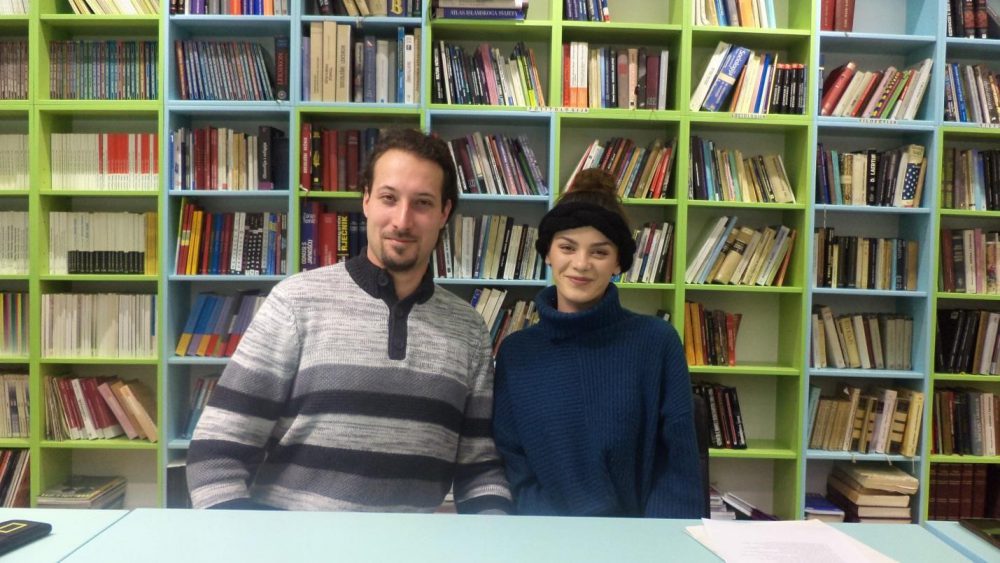
______
This story was produced during the three-month Program for Students of Journalism in the Western Balkans within the framework of the advocacy project “A Better Region Starts with Youth” implemented by RYCO with the support of the Federal Republic of Germany. All journalists’ work is their own and the content of any given article does not represent the opinion of RYCO, and RYCO cannot guarantee the validity and the accuracy of the information that these stories contain.
